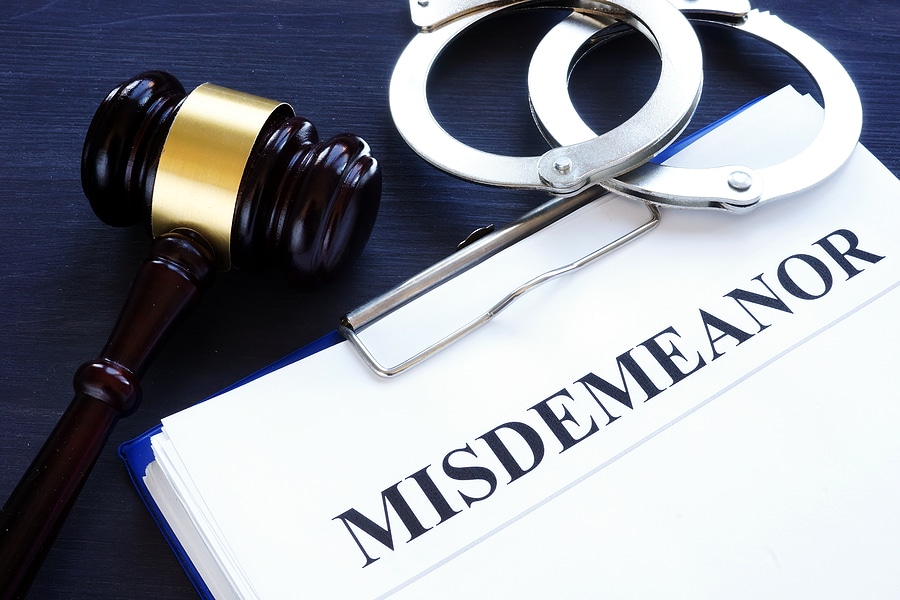As a criminal defendant in Wisconsin, your legal rights do not vary based on the severity of the charges against you. In every single case, you have legal rights. When you have been charged with a misdemeanor, you would consult a lawyer to review your case and help determine whether you should reach a plea deal or defend against the charges. It is up to law enforcement to prove the case against you, or you would be acquitted at trial.

The Different Types of Misdemeanors in Wisconsin
In Wisconsin, there are four types of misdemeanors:
- A Class A misdemeanor is the most serious type, and it is punishable by up to nine months in prison and/or a $10,000 fine. Examples of a Class A misdemeanor include certain types of battery and theft of property valued below $2,500
- A Class B misdemeanor is punishable by up to 90 days in prison and/or a fine of up to $1,000. The most common example of a Class B misdemeanor is disorderly conduct
- A Class C misdemeanor is punishable by up to 30 days in prison and/or a fine of up to $500. The most common example of a Class C misdemeanor is possession of controlled substances that are not narcotics
- Unclassified misdemeanors often include certain types of OUI charges. Some of these unclassified misdemeanors, such as a third offense OUI, can result in up to one year in prison
There May Be Dramatic Impacts on Your Life from a Misdemeanor Conviction
No matter what type of misdemeanor you have been charged with, you need the help of an experienced criminal defense attorney. Do not make the mistake of thinking that a misdemeanor is not a serious charge because it is not a felony. Many misdemeanors can carry the possibility of jail time. In addition, you may experience significant impacts on your life in the future, whether it is your ability to qualify for certain jobs or in a custody case. If you are not a permanent resident, certain misdemeanor charges can even result in your removal from this country.
The Prosecutor Must Prove the Case Against You
In any criminal case, you have one major right as a defendant. You are innocent until you are proven guilty. The prosecutor is the one who has the burden of proof to demonstrate every single element of the alleged crime. If they cannot prove even one element, you cannot be convicted. In reality, the prosecutor may have the advantage of a sympathetic jury. You would need to present your own case, especially after the prosecutor has managed to introduce their own evidence.
You do not have to be rushed into doing something that does not seem right. First, you have the right not to answer any questions. Law enforcement must stop their attempts to question you as soon as you say that you want a lawyer.
Even when you are innocent, the prosecutor may still try to pressure you into accepting a plea deal. You may be tempted to accept one because it cuts your risk of jail time. However, there may be a chance that you can fight the charges in court and win. Your attorney would advise you on whether it makes sense to negotiate a plea deal with the prosecutor. There are times when it is in your best interests to do so, especially when you are able to avoid any time in jail.
You May Have Defenses to the Charges Against You
There may be times when you can defend against the charges filed against you. Even if you do not have any specific defenses, you may have your own evidence that proves an alibi, or you may be able to disprove the prosecution’s case. Then, you may have some defenses that could lead to the charges being dismissed or the suppression of key evidence being used against you. These defenses include:
- Police did not have reasonable suspicion to make an investigatory stop
- Police did not have probable cause to make an arrest
- The evidence that is being used against you was collected in an illegal search, or it is the fruit of a poisonous tree
- Police violated your rights after they arrested you, such as trying to question you without a lawyer present
- The evidence being used against you is otherwise faulty – for example, there may not have been a proper chain of custody
If you are challenging evidence that is being used in your case, you would file a motion to suppress before the trial begins. The prosecution would have had to list the evidence that they intend to use against you at trial. If you managed to get a crucial piece of evidence suppressed, it could mean the end of the prosecution’s case, and they may have to dismiss the charges.
You Could Negotiate a Plea Bargain for a Lesser Sentence
In other cases, you may elect to negotiate with the prosecutor. Depending on the class of misdemeanor, you could be facing up to nine months in jail. However, many misdemeanors do not require minimum jail sentences. Alternatively, the judge may have the ability to suspend the sentence. You may decide that the best strategy is to manage your risk and reach a plea deal. There is a chance that you could manage to avoid a jail term entirely.
Contact an Appleton Criminal Defense Attorney Today
If you find yourself in the criminal justice system, you are doing yourself a disservice if you attempt to deal with the charges against you on your own. The prosecutor has immense resources at their disposal to win a conviction. The attorneys at Hogan Eickhoff can provide you with tough legal representation to protect your rights. You can call us today at (920) 450-9800, or you can contact us online to schedule your free initial consultation.
